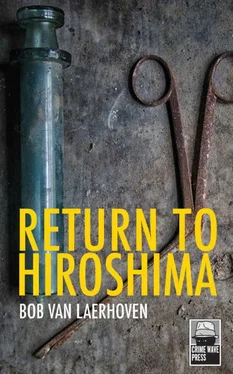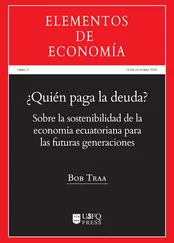Perhaps you’re smarter than I imagined. We all make a story of our lives. But the leading role we play is split, subdivided within us. We incarnate both the lover and the goddess of revenge, the witch, the whore and the Madonna. My story has its roots in years on Hashima, when I lost the ability to distinguish dream from reality. We all do the same to some degree since we’re neither animals nor angels, but those who go too far, like you with your dismal imagination, are doomed to wallow in a pool of self-torment for the rest of their lives.
(If you don’t come back; if this is the price I have to pay for the sorrow I feel for my child, then the curse I have endured will turn on you, and – as I imagine you already know – you will come to a bad end.)
Hiroshima – Saijo – Takeda, Nagai Shiga And his wife – midnight, March 15 th1995
Takeda turns to Reizo’s father. “Where can I find your son?”
“He left home more than a year ago. He wants nothing to do with us.”
Takeda turns to Reizo’s silent mother. She’s sitting on her heels, her hands resting on her lap. Her face is a world of contradictory emotions. He catches her eye. He nods almost imperceptibly.
“He’s living in a squat in Kabe-cho,” she says, staring at the floor. “With a group of foolish youngsters. He deals drugs and he’s addicted himself.”
Nagai Shiga looks at his wife, surprised, irked.
“I was there earlier this evening,” says the inspector. “The place is locked up. There was no one there.”
Nagai Shiga rubs his cheeks and then his eyes. “Those kids are creatures of the night. Then they wander round in their dreams, which they defend to the hilt.”
His wife pours a second cup of tea. “Who knows what’s going on in their heads? They’re greedy, they don’t know how to cope with their lives so they create their own world. Reizo was always a difficult child. He had such an insatiable longing. I don’t know where it came from, but it got worse as he grew up. Then, about a year ago, he joined that sect…” She turns to her husband.
“Aum Shinrikyo,” says Nagai Shiga finishing her sentence. “Reizo made his vows in the temple.” He looks at the inspector almost apologetically. “The sect doesn’t only target people with an infantile understanding of the world like Reizo, they also attract highly educated academics. They say the founder, Shoko Asahara, is just a front for someone else. Nobody’s sure who he is, but he’s supposed to be nicknamed Rokurobei.” The economist observes the inspector’s silent reaction and continues: “I’ve tried to find out as much as I can about the sect, inspector. I wanted to protect my son. But for reasons I don’t understand, his father no longer matters to him.”
“Your brother Tomio Shiga, the managing director of Dai-Ichi-Kangyo Bank, died recently in a mysterious gas attack together with a number of other senior staff and assistants.”
The economist glances at his wife. “They told us that the police still don’t have any information that might lead them to the perpetrators.”
“I have a theory,” says Takeda. “Your father…”
“Please, inspector,” says the economist. “It’s late and we’re tired, my wife and I. Can’t we continue this conversation at another time? Let me walk you to your car, but first…if you’ll excuse me for a second…” Takeda notices a silent supplication in Nagai Shiga’s eyes. Shiga says nothing for a second or two, then respectfully bows his head, stands and leaves the room.
Did his wife notice the silent message? She adjusts the collar of her kimono and mumbles: “Reizo was always a dreamer… boundaries for him were unacceptable. Mishima was his great hero. Reizo was convinced Mishima’s coup d’état should have worked. He shouted it from the rooftops. Then, according to Reizo, there would have been more real men in this country of ours.” She directs her pale, dispirited eyes at Takeda. “You might think I’m just a foolish mother, inspector, but let me tell you this: hungry, unbridled fantasies like those Reizo nurtures have been the cause of more evil in human history than passion and greed.”
Hiroshima – Takeda’s wife Ayako in their apartment – midnight, March 15 th1995
In her sleep, a great fatigue weighs upon her. Once her body could run for hours. She wasn’t fast, but equably. Her friends – she was a student then – called her “the Diesel.” She never dared to ask if it was a compliment or an insult.
There was so much she never dared in her life. She likes to think of herself as an oyster, clamped shut, hiding precious beauty behind her tough shell.
She sits up before she realizes that she’s awake. A familiar small breeze whiffed from the corridor: the front door opening and closing, her husband coming home earlier than expected. The man who enters the room is a total stranger, not even a Japanese. She’s standing now, her arms in front of her. The way how he comes up to her. She backs away, turns, runs into the kitchenette. He’s right behind her, a silent stranger. Her body is hot now, burning with a sudden fever.
It turns heart-stopping cold when he grabs one of the kitchen knives out of the rack.
Notes from Mitsuko’s basement prison
When I was a teenager, I dreamt about a house in the middle of a garden with laughter and the sound of splashing water. I saw a man next to a little pond with a pretty waterfall. He was pushing a child in a swing. The garden was a haven of light and colour. Dreams had become my reality, my waking life a dream. Now that my life has descended into a nightmare, why can’t I picture that sweet garden anymore? Why does it hurt so much when I try? Why is the pain so incomprehensible, so terrifying?
For a time there was a woman in my life – not my mother – who looked after me and asked me all sorts of questions. Her name was Mayumi. Something happened to her. Then my father cut off her father’s head. Why? And that’s not the only strange thing. When I think back to that horrible episode, something doesn’t square. There was a switch somewhere .
Switch: it has become a keyword in my life. As if someone switched places with me, early on, unexpectedly.
(You didn’t even leave me a glass of water.
Does that mean you won’t be away for long? How long have I been here? I don’t feel thirsty, no, not yet.
If I die here, my father will dip the tips of his fingers in your blood and paint my name on your belly.
Come back! Get me out of here. The pressure of the earth above me is suffocating. The thunder of the trains is like the breath of some resentful ghost in my neck.
Don’t chance your luck, fool. You’re dealing with the daughter of Rokurobei.)
(Get me out of here. You can have me. I’ll have sex with you. I’ll climb on top and do the things I saw in my father’s films. You’ll die dribbling with pleasure.)
Father, why don’t you come?
Hiroshima – Adachi’s apartment near the Peace Tower – Adachi, Yori and Becht – midnight, March 15 th1995
Adachi isn’t sure how to deal with the situation. He feels as if he’s landed in a nightmare. He’s suddenly reminded of a statement made by the Noh director Tadashi Suzuki, someone he’s admired all his life: “People say Noh theatre is absurd and grotesque, pregnant with tragedy, a chaos of gods and demons, but I say: Noh theatre dines at the table of reality. So many people close themselves off to the tears in the theatre curtain in which we have wrapped reality and dam up their lives with work and karaoke, with laws and prohibitions. Look around you, listen to the stories your friends have to tell you, open the papers, turn on the TV: the cycle of meaning is everywhere. You read about the threads of people’s lives becoming entangled with others, acquire insight into coincidences that create extraordinary new circumstances, you imagine yourself as an urban cannibal chopping up his victims and eating them, you are the father who lusts after his daughter, you live in a world of rats and syringes, you are the mother who strangles her child at birth, you are the hero who rushes into a burning house to save the lives of complete strangers.” Adachi has never forgotten Suzuki’s statement about the absurdity of life, but he’s never fully understood it. Now he’s convinced he’s got himself into the kind of situation the Noh master had in mind: his entire life is suddenly out of kilter, and what amazes him most is the self-evidence of it all.
Читать дальше












